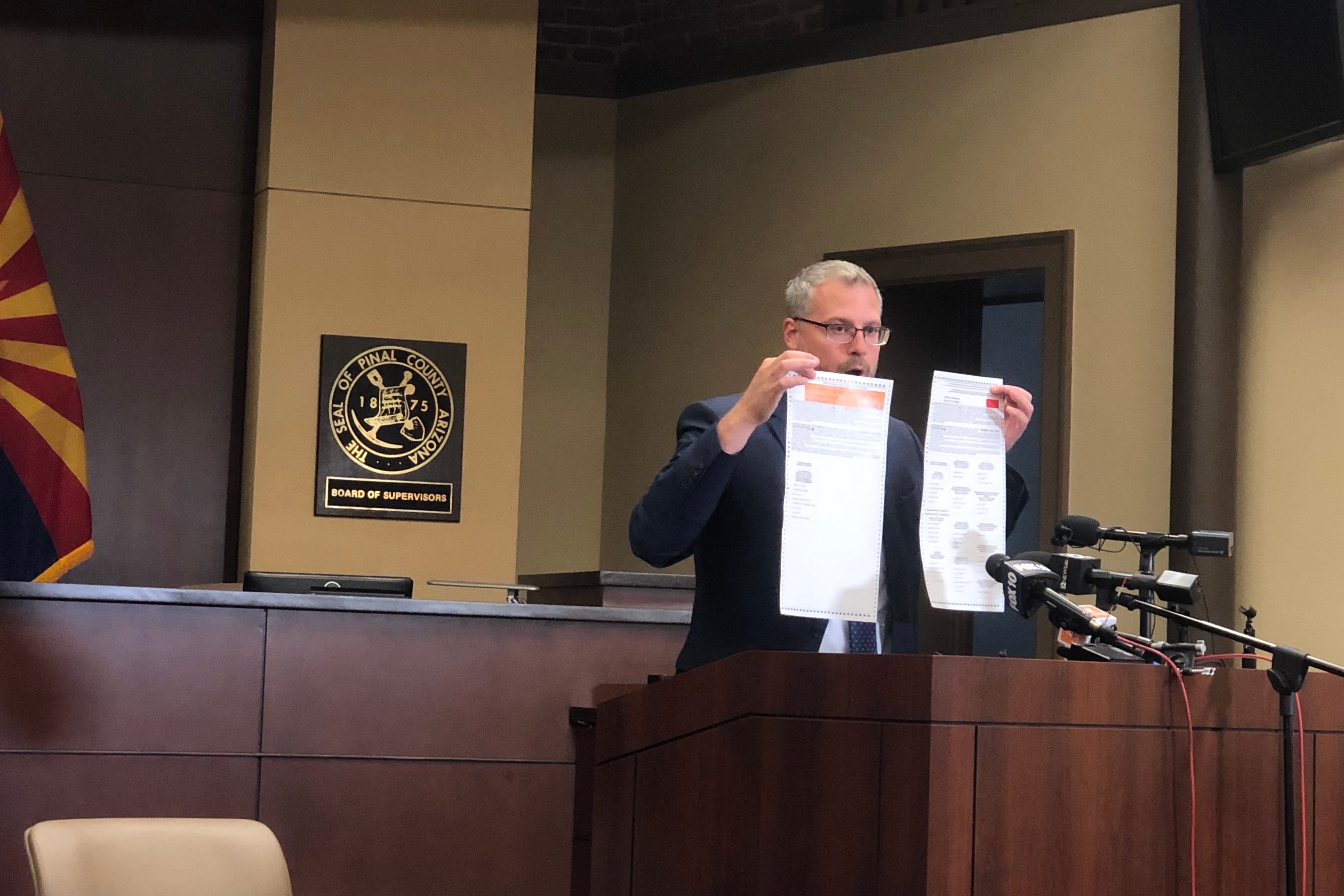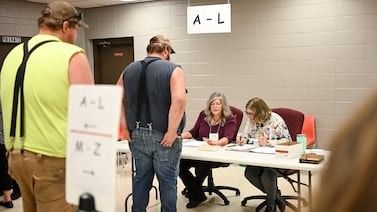When David Frisk took over Pinal County’s elections in March after arriving from Washington state, he was the third director on the job in the past two years. He was greeted by a staff of one — in a department that should have had five full-time workers.
So it may not be a shock that four months later, an office recovering from so much turnover would have to confront the fallout of a major ballot-printing problem. Municipal races for seven communities were missing from more than 60,000 primary ballots that went out in early July. Candidates for those local offices cried foul, wondering where their names were. Some voters in the growing county of about a half-million residents southeast of Phoenix cast ballots without noticing.
The county has so far declined to give a specific accounting of exactly what went wrong, but officials did say the mistake was caused by a staff member’s programming error, and pre-election processes didn’t catch it. Frisk’s office has since taken extraordinary measures to issue additional early ballots enabling residents to vote in those races.
“I think someone would have caught that who had more experience” in the county’s local elections, said Virginia Ross, the Pinal County recorder, whose office was not responsible for the error but works closely with the elections office and has seen the staff turn over. One director, who served for more than five years, left for a new job in Nevada in late 2020. An interim replacement left for a Texas elections position, creating the opening Frisk filled in March.
And, of course, there were the other staff vacancies. Ross, the Pinal County recorder, said people left elections for better opportunities and pay.
Pinal’s problems could be a sign of what’s to come in the high-stress, high-stakes field of election administration, where human errors certainly happen regardless of experience but where a seasoned elections director and experienced staff have a better chance of noticing, several elections experts and officials told Votebeat.
In Arizona and around the country, it is a time of upheaval in elections, as prominent officials stepped down after disputes over the 2020 election dragged on for years, even in counties where Trump won handily. They cited harassment and threats, spurred by false claims of a stolen election, as part of why they stepped away.
“I have a feeling that we’re gonna see a lot more attrition, we’re gonna see a lot more flight of knowledge, and that can manifest itself in mistakes, in large mistakes that could not just result in inconveniences for voters,” said Ken Matta, a longtime election security officer at the Arizona Secretary of State’s Office who now works as CIO for Runbeck Election Services. “I believe that it may also result in lawsuits. … It could get a little chaotic.”
It’s not easy to recruit for a complex job with relatively low pay, long hours, and endless hostility from people clinging to false information, especially at a time when nearly all sectors are trying to hire.
Frisk, who previously worked in elections in Washington, isn’t talking to the media until the Aug. 2 primary is over and the county board of supervisors has a chance to review what went wrong with the ballots, the county’s spokesman says. Frisk does have election experience: He was the program manager for the Elections Division in Kitsap County, a less populous county than Pinal. The county wouldn’t detail whether the elections systems in Pinal are different from the ones Frisk used in his previous role.
But he’s taken the fall publicly. He told the supervisors it was his fault because he should have caught the programming error that led to the problem.
For some jurisdictions, the departure of one elections administrator won’t have a huge impact, provided that experienced staff stick around. But for smaller counties and rural areas, one person could take the bulk of the county’s election knowledge with them out the door. And, depending on who replaces the top post, staff could leave — especially if someone who denies the 2020 election results takes over.
How much has turnover increased among election workers? No one knows for sure.
Anecdotally, it’s clear that skilled people, in Arizona and across the country, are leaving their elections jobs. But there’s not much reliable data to track whether turnover is worse than a typical year, though researchers like Paul Gronke at Reed College have started surveying election workers to try to understand the problem, which is especially hard to detect among the non-elected office workers.
“We have no idea how much turnover there is at the staff level,” Gronke said. “And the problem may be bigger than we even realize it is, because we don’t know about the staff.”
In Arizona, elections are run by two separate offices: an elected recorder and an elections department led by an appointed director. The two offices divvy up elections responsibilities.
Seasoned Arizona election officials in those roles have been stepping down. Some shared their experiences over the past couple of years, which illustrate both why attrition could be getting worse, and why attracting new talent will be a struggle.
In Yuma, real people and real problems
Former Yuma County Recorder Robyn Stallworth Pouquette, first elected in 2008, left her post in July, before the end of her term, for a new job in risk management at the county.
Going into the 2020 election, Stallworth Pouquette believed it’d be the best election they’d carried out so far. Her staff waded through COVID-19 successfully, even navigating one point during the early voting period when 80% of staff was out because of the virus, she said. But she realized by October 2020 that they were “embarking on a pretty different journey in election administration.”
“The general public was one of two things: They were either kind and courteous, excited to vote, or they were rude and hateful and completely reluctant to trust their ballot to me or my office’s possession. So I would say that was 50/50, sadly, but I think I completely underestimated the possibility of brutal verbal abuse,” she said.
While recorder, she took the work home with her after long days at the office fielding calls from the people who spewed vitriol at her, her staff, and elections in general. She would lie awake at night ruminating over how to handle all the negative communication she received, then wake up and go do it all again.
“In the days following the election, most calls or in-person interactions with people involved either being yelled at, cursed at or called names,” she said, adding, “I don’t think I’ve ever even heard the word ‘bitch’ that many times in a 24-month period.”
And at home, the election landed at their dinner table. Her son, who was in 7th grade in the fall of 2020, would hear from classmates who said their parents thought his mom should be arrested, or that her office had destroyed ballots cast for Trump.
The onslaught this year of “2000 Mules,” a widely debunked documentary that uses dubious data points to make claims about ballot drop boxes, made it worse, though the two years after 2020 were never quiet. Her sister called after its debut and told her she had to watch the new movie, and Stallworth Pouqette “lost it,” delivering a lengthy lecture that, she jokingly said, made her sister not want to call her again.
Even her husband, who she describes as a “saint,” asked questions about election misinformation he’d seen online. She felt constantly on guard, ready to defend the good work her office did.
Still, she thought, for the longest time, that she could answer everyone’s concerns and win them over. But some of the angriest callers weren’t even registered to vote or hadn’t participated in the election. The man who called her a bitch multiple times in a phone call a few days after the election? Never voted.
Stallworth Pouqette is a Republican. Trump won Yuma County. Nothing seemed to matter.
“I voted for Trump,” she said. “And I’d really like to sit down and have a conversation with him. Because these are real people that have been impacted by these problems. These are real people with real families that have been impacted by the onslaught of harassment and misinformation.”
Since she still works for the county, she’s only a few hundred feet away from the recorder’s office and happy to help answer any questions. Elections need a qualified workforce that can navigate the complex laws and policies that govern the process, so departures certainly cause concern. But, she said, she had to be “humble enough” to accept that someone else maybe “could pick up the torch and run with it.”
Richard Colwell, the newly appointed recorder, previously worked for the superior court clerk and was a police officer in Yuma.
“Perhaps it is OK to have new leaders come in and have a different perspective,” Stallworth Pouqette said. “But you’d have to have a very healthy balance” of experience and freshness.
Vague threats and character assassination in Yavapai
Stallworth Pouqette’s counterpart and friend in Yavapai County, former Recorder Leslie Hoffman, stepped down in July, too, as did Yavapai’s elections director, Lynn Constabile. Hoffman was the recorder for more than 10 years.
Hoffman, a Republican, faced protests at nearly every step. Since the 2020 election, which Trump won overwhelmingly in Yavapai County, she’s received a steady stream of vague threats, like “you better watch out,” and an endless “distraction campaign” of calls, emails, and public records requests. A sheriff’s patrol routinely circles her house to ensure her safety.
“After a while, the character assassinations get really old,” Hoffman said. “And especially when a lot of them come from people that I’ve known for years. I’ve lived here since the ‘60s, when my family moved here.”
She’s struggled to understand why she became the target of so much harassment in her home county, since people upset that Trump lost his re-election haven’t specified any local problems with how the election was run. One man told her, though, that she was simply “an easy mark.”
After one protest outside the elections building, protesters littered their signs on the sidewalk after they left, which said a lot to Hoffman about the kind of people involved, she said. Her staff picked them up.
“Then when they came to protest the next one, we had everything in a box and gave it back to them,” she said.
Hoffman left a job she loved in elections for a better-paying gig outside the industry, though she’s not disclosing her new position or workplace. Constabile hasn’t spoken to the media about her departure, but Hoffman has said she left for similar reasons.
Hoffman worries about who will staff elections in the future, considering what they’ll have to deal with, but she trusts that her county can still successfully pull off this election without her. The supervisors appointed Michelle Burchill, previously the elections manager, to fill the recorder vacancy.
“We don’t do this for the money,” Hoffman said. “We’re doing this because we love what we’re doing. Our big thrill is the audit at the end of the night, not who won. If the numbers match, woohoo! We’re a bunch of dorks.”
Hoffman spoke with Votebeat on her second-to-last day in office. After she spoke publicly about the harassment and threats she faced, she heard privately from a lot of supporters. But many of them aren’t vocally defending her. She wishes more people spoke up.
“If the good people are not supported, (counties will) lose them. And (critics) are destroying our elections process — whether it’s good or bad, it’s being torn apart. People can only take so much,” she said.
“Horrible, horrible things”
Matta, formerly of the secretary of state’s office, left his job in May after almost two decades, through both Republican and Democratic administrations. As part of his duties, he was tasked with wading through the messages the office got and deciding whether they constituted threats in need of forwarding to law enforcement. It weighed on him heavily, and it was a task he wasn’t trained for. What if he didn’t flag a threat that turned physical?
“I’ve seen the worst in people as they are concerned about the misinformation they’re hearing about a stolen election,” Matta said. “Just horrible, horrible things. They’re threatening us, our children.”
Matta fears the turnover and attrition could get worse before it gets better. He worries about how staff turnover exposes elections to “insider threats,” like newcomers who harbor unfounded suspicions of the system, but also about the loss of institutional knowledge. For practical things like equipment, vendors can help people get up to speed, but the extensive policies and procedures that keep elections secure and accurate take more time to learn, he said.
Gronke, the Reed College researcher, said elections jobs haven’t kept up with the increasingly complex landscape of elections themselves. For officials in some places, elections make up only part of their job responsibilities, such as in the cases of clerks who also issue marriage licenses and record property deeds.
The dearth of research on these workers leaves big questions about how recruitment plays out, whether there’s a pipeline of people ready to work elections, how they’re trained, and more, he said. But these are critical questions that people should be asking of their local governments, he added.
“We have heard much this year about a wave of retirements, but we actually know next to nothing about historical rates of retirement and turnover,” Gronke and two co-authors wrote for the Democracy Fund. “This makes it impossible to know if we are experiencing a brain drain or just a typical spike that occurs after a presidential year.”
The stakes are especially high in today’s contentious environment for elections. Jeff Ellington, the CEO of Runbeck Election Services, said every minor problem in an election now gets inflated into a conspiracy. When a printer runs out of toner, like it would in office complexes around the country on any given day, it’s suddenly evidence of malfeasance for a certain crowd, he said. It “becomes a conspiracy versus just the human condition.”
Technology helps elections run smoothly and efficiently, he said, but humans are a critical part of the process. And humans are notoriously error-prone compared to machines.
“There are going to be mistakes that don’t have some higher purpose and reason behind them,” he said.
But, both Matta and Ellington said, it’s important for the public to scrutinize the information they’re hearing and assess its accuracy. And, beyond that, skeptics need to understand the people running elections are their neighbors, their friends and family. The more the jobs are subject to harassment, the less willing people will be to take them.
“You don’t really hear kids going to school going, ‘I want to be in election administration. I want to work for county government,’ ” Ellington said. “Some of it’s just educating that these jobs, they’re rewarding, they’re fun. It is a good group of people that work there.”
What went wrong in Pinal
Back in Pinal County, TV cameras filled a meeting room where, on July 18, a couple of county supervisors, the county sheriff, and the county attorney told reporters, who were largely from outside the county, how they would rectify the ballot errors.
The county sent out a second set of ballots, with an orange bar at the top, to the people in the seven towns affected. County staff are reaching out to voters via multiple methods, including ads in newspapers and social media, to let them know about the changes.
They’ll have to count carefully, with two different sets of ballots. They may have to recount some races. They more than likely will be sued.
The county is reluctant to blame staffing or any other single issue at this point, but County Attorney Kent Volkmer noted at a press conference that “there was a recent change in a recent appointment of a new elections director that immediately preceded this problem.”
The person who made the programming error is still working at the county because “we still need him,” Volkmer said. It’ll take way more staff to remedy the problem. Volkmer estimated the county would have “upwards of 100 workers” — a combination of poll workers, county employees, and new hires — helping to ensure the new ballot process goes well. The additional cost to the county was “north of $100,000 and running.” Once the election is over, he said, an investigation will show what went wrong and how to make sure it doesn’t happen again.
Two previous staff in the department were promoted within the county, and another retired. The remaining staff member when Frisk arrived has been with the department since 2013, county spokesman James Daniels told Votebeat. Since Frisk started, he’s recruited new staff to fill the vacant positions.
The supervisors will receive a full report and presentation on what happened at a future public meeting, so the county won’t share many specifics until then.
Frisk, the elections director, told the supervisors that the human error occurred when transferring ballot style assignments from the state’s voter registration database system to Electionware, the election management software the county uses.
Frisk acknowledged proofing did not catch the misstep, which he said was his fault. “Thorough proofing would have prevented this error,” he said.
The secretary of state’s extensive logic and accuracy tests don’t apply to local races, just state, federal and legislative ones. At the press conference, Volkmer explained that the logic and accuracy tests of the municipal races “aren’t as robust” as the state’s, and didn’t catch the errors.
There were 938 different ballot styles for the 108 precincts in Pinal County, Frisk told the supervisors.
“We actually did a test, but two of our municipalities were not impacted” by the ballot misprint, Volkmer said. “It just happened that the tests we ran happened to be on the unaffected municipalities.”
Pinal, the third-largest county by population, has seen massive growth in the past two decades. In June, the county employee who oversees human resources told the supervisors about retention and recruitment challenges countywide. Daniels pointed to a national story about local governments’ difficulty hiring and said he didn’t believe the challenge was linked to Pinal County’s growth.
Ross, the recorder, is also on her way out. She isn’t running for re-election and will probably leave before her term is up, though not before this year’s elections, she said. Ross hasn’t faced the threats and harassment her colleagues in other counties have, but plans to leave because she and her husband are looking to move out of Arizona for family reasons, she said.
Elections have a “steep learning curve,” and while directions like the elections procedures manual are helpful, they still take time to fully understand and implement, Ross said.
“When something like this happens, I believe it does shake someone’s confidence, because it obviously plays out in a public forum. And that can weigh on people, whether they want to make elections a career choice, or they’re just going to go off and find some other opportunity,” she said.
Rachel Leingang is a freelancer for Votebeat and co-founder of the Arizona Agenda. Contact Rachel at rleingang@votebeat.org.






